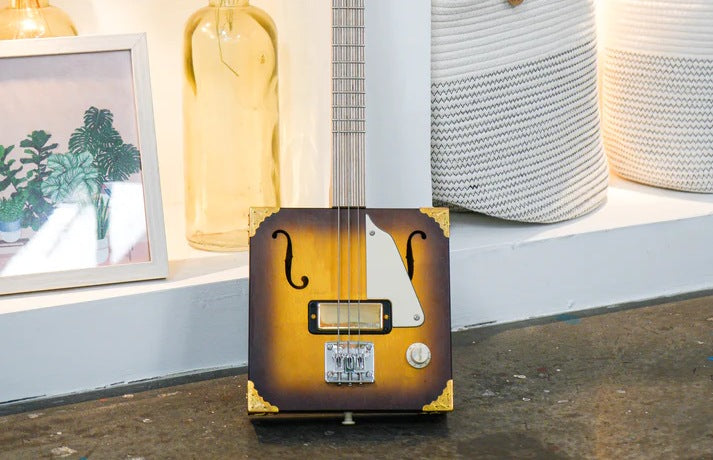Strumming simple three-string melodies on a homemade cigar box guitar may seem like a novelty, but these gritty DIY instruments have a rich history intertwined with roots music like blues, folk, and ragtime. Playing cable-string tunes on a battered repository of stogies connects you directly to the homemade instruments of early American musicians.
As the cigar box guitar (CBG) underground continues to grow, companies and luthiers now offer handsome, playable cigar box guitars made for more than just casual plinking. But with options ranging from kits to custom builds, how do you know where to start?
In this beginner's guide to purchasing your first cigar box guitar, we’ll unpack the unique features of CBGs and what to look for when buying an instrument built for playability. We’ll demystify critical considerations like string spacing, fret type, pickup configuration, and more while spotlighting some top instruments perfect for new players. Whether you’re a fan of the primitive, punk DIY ethos or simply want to dip into the distinctive sounds of handmade folk instruments, we’ll help you find your first cigar box guitar soulmate.
Understanding Cigar Box Guitars
Before diving into the selection process, it’s essential to understand what cigar box guitars are. Originating in the 19th century, these instruments were born out of necessity and resourcefulness, using cigar boxes as resonators. They have since evolved into a craft of their own, often handmade with a level of personalization that is rare among standard guitars.
Sound and Acoustics
The sound of a cigar box guitar is raw and resonant, often described as “bluesy.” Unlike regular guitars, which typically have six strings, cigar box guitars can range from one to six strings. The number of strings will influence the sound and playability, with fewer strings typically yielding a more primitive, bluesy tone.
Choosing the Right Size and Shape
Cigar box guitars come in various sizes and shapes, each contributing to the instrument's sound and playability. Smaller boxes tend to produce a sharper, more focused sound, while larger ones offer a deeper, more resonant tone. Consider the size of the box in relation to your body size and comfort when playing.
Materials Matter
The materials used in a cigar box guitar significantly impact its tone and durability. Common woods like maple, oak, and mahogany are popular for their harmonic qualities. The neck material also plays a crucial role; a harder wood will provide better sustain and stability.
Neck and Fretboard
The neck of the cigar box guitar should feel comfortable in your hands. Whether you prefer a fretted or fretless model, the action—distance between the strings and the fretboard—should be low enough for easy playability but high enough to prevent buzzing.
Hardware and Electronics
The quality of the tuners, bridge, and nut will affect tuning stability and intonation. If you plan to amplify your cigar box guitar, consider models with built-in pickups. The type of pickup can vary from piezo to magnetic, each offering a different sound quality.
Artistry and Aesthetics
One of the joys of cigar box guitars is their individuality. Many are handcrafted with artistic designs, making them not just instruments but pieces of art. Choose one that resonates with your personal style.
Budget Considerations
Cigar box guitars can range from very affordable to premium prices. Set a budget before you start your search, but be prepared to invest a bit more for a quality instrument that will last and provide the best playing experience.
Where to Buy
You can find cigar box guitars at local music stores, artisan markets, or online. Buying from a reputable maker or retailer ensures you receive a quality instrument. For those looking to buy a premium Guitar, Howlin Rooster offers a selection of finely crafted instruments that stand out both in sound quality and aesthetics.
Try Before You Buy
If possible, play several cigar box guitars before making a purchase. This hands-on experience is invaluable. The guitar should feel comfortable, and the sound should be pleasing to your ear.
Community and Culture
The cigar box guitar community is vibrant and welcoming. Join forums, attend festivals, and connect with other players to learn more about the instrument and its culture.
Understanding the Scale Length
Scale length is the distance between the bridge and the nut of a guitar. It determines the tension of the strings and affects playability and tone. Shorter scale lengths produce less tension, making the guitar easier to play, with a warmer tone. A longer scale length results in higher tension, offering a brighter tone and more volume. Consider what kind of sound and playability you're looking for when choosing your cigar box guitar.
Intonation and Tuning
Intonation refers to the guitar's ability to stay in tune along the entire length of the fretboard. Good intonation is crucial for the guitar to sound in tune when you play chords or melodies. Check the intonation by playing notes at various frets and listening for pitch accuracy.
Pickup Selection for Amplification
If you plan to perform with your cigar box guitar, the choice of pickup is critical. A piezo pickup will capture the vibration of the instrument and produce a raw, acoustic sound. Magnetic pickups, on the other hand, are typically associated with electric guitars and will give a more traditional electric sound. Some cigar box guitars even come with a combination of both for a versatile setup.
Adjustability and Customization
Look for cigar box guitars with adjustable bridges and truss rods. These features allow you to set the action to your preference and maintain proper neck curvature, ensuring comfortable playability and optimal performance.
The Importance of the Right Strings
Strings play a significant role in the sound and playability of your cigar box guitar. Lighter gauge strings are easier to play and bend, while heavier gauges produce more volume and sustain. Some cigar box guitars are designed for specific types of strings, so it's important to know what strings the instrument is set up for.
Playing Style and Techniques
Your playing style is another factor to consider. If you plan to play with a slide, you may want a higher action and a fretless neck. For fingerpicking or strumming, a fretted neck with lower action might be more suitable.
Size and Portability
Cigar box guitars are known for their compact size, making them highly portable. If you travel frequently or enjoy playing outdoors, consider the size and weight of the instrument for easy transport.
Accessories and Extras
Some cigar box guitars come with accessories such as straps, gig bags, or even small amplifiers. These extras can be beneficial, especially for beginners who may not have existing gear.
Warranty and Support
Check if the manufacturer or seller offers a warranty or support after purchase. This can be valuable if you encounter any issues with the instrument.
Reputation and Reviews
Do your research on the brand or builder of the cigar box guitar. Look for reviews and testimonials from other musicians to gauge the quality and reliability of the instruments they produce.
Joining Workshops and Building Classes
Some enthusiasts opt to build their own cigar box guitars through workshops. This can be a valuable learning experience and allows for complete customization of your instrument.
Resale Value
While not the most important factor, consider the potential resale value of the cigar box guitar. A well-made, branded instrument may hold its value better than a generic one.
Taking the Plunge
Once you have considered all these factors, you are better equipped to make your choice. Remember, the right cigar box guitar should not only sound good but also inspire you to play and create music.
Final Thoughts
Buying your first cigar box guitar is an exciting step into a world of musical creativity and expression. With careful consideration of the points outlined in this guide, you can find an instrument that will be a joy to play for years to come. Whether you're playing for yourself or performing for others, your cigar box guitar will surely add a unique and captivating sound to your music repertoire.

